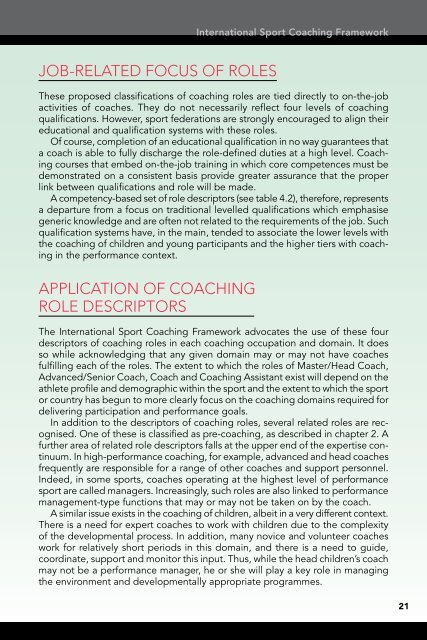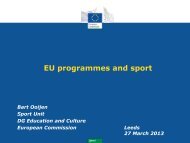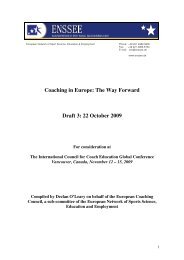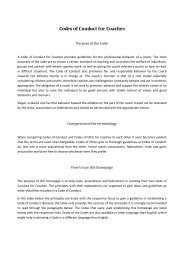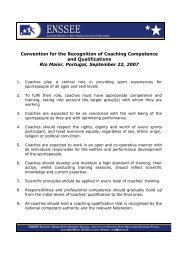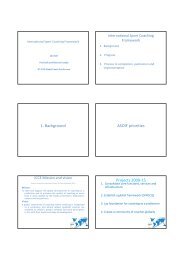International Sport Coaching Framework â version 1.1
International Sport Coaching Framework â version 1.1
International Sport Coaching Framework â version 1.1
Create successful ePaper yourself
Turn your PDF publications into a flip-book with our unique Google optimized e-Paper software.
<strong>International</strong> <strong>Sport</strong> <strong>Coaching</strong> <strong>Framework</strong><br />
JOB-RELATED FOCUS OF ROLES<br />
These proposed classifications of coaching roles are tied directly to on-the-job<br />
activities of coaches. They do not necessarily reflect four levels of coaching<br />
qualifications. However, sport federations are strongly encouraged to align their<br />
educational and qualification systems with these roles.<br />
Of course, completion of an educational qualification in no way guarantees that<br />
a coach is able to fully discharge the role-defined duties at a high level. <strong>Coaching</strong><br />
courses that embed on-the-job training in which core competences must be<br />
demonstrated on a consistent basis provide greater assurance that the proper<br />
link between qualifications and role will be made.<br />
A competency-based set of role descriptors (see table 4.2), therefore, represents<br />
a departure from a focus on traditional levelled qualifications which emphasise<br />
generic knowledge and are often not related to the requirements of the job. Such<br />
qualification systems have, in the main, tended to associate the lower levels with<br />
the coaching of children and young participants and the higher tiers with coaching<br />
in the performance context.<br />
APPLICATION OF COACHING<br />
ROLE DESCRIPTORS<br />
The <strong>International</strong> <strong>Sport</strong> <strong>Coaching</strong> <strong>Framework</strong> advocates the use of these four<br />
descriptors of coaching roles in each coaching occupation and domain. It does<br />
so while acknowledging that any given domain may or may not have coaches<br />
fulfilling each of the roles. The extent to which the roles of Master/Head Coach,<br />
Advanced/Senior Coach, Coach and <strong>Coaching</strong> Assistant exist will depend on the<br />
athlete profile and demographic within the sport and the extent to which the sport<br />
or country has begun to more clearly focus on the coaching domains required for<br />
delivering participation and performance goals.<br />
In addition to the descriptors of coaching roles, several related roles are recognised.<br />
One of these is classified as pre-coaching, as described in chapter 2. A<br />
further area of related role descriptors falls at the upper end of the expertise continuum.<br />
In high-performance coaching, for example, advanced and head coaches<br />
frequently are responsible for a range of other coaches and support personnel.<br />
Indeed, in some sports, coaches operating at the highest level of performance<br />
sport are called managers. Increasingly, such roles are also linked to performance<br />
management-type functions that may or may not be taken on by the coach.<br />
A similar issue exists in the coaching of children, albeit in a very different context.<br />
There is a need for expert coaches to work with children due to the complexity<br />
of the developmental process. In addition, many novice and volunteer coaches<br />
work for relatively short periods in this domain, and there is a need to guide,<br />
coordinate, support and monitor this input. Thus, while the head children’s coach<br />
may not be a performance manager, he or she will play a key role in managing<br />
the environment and developmentally appropriate programmes.<br />
21


